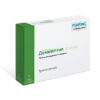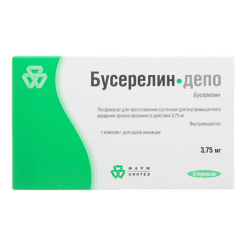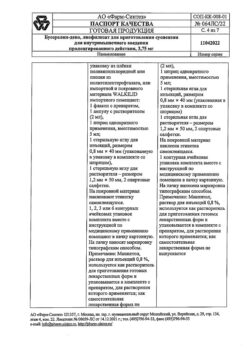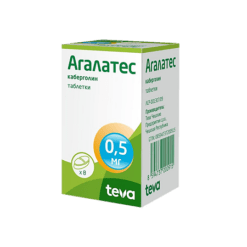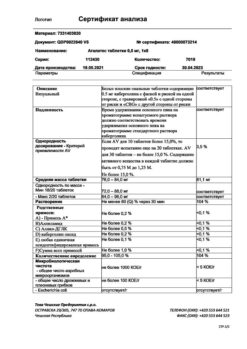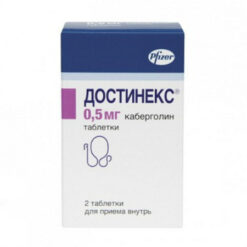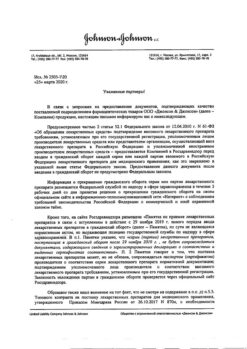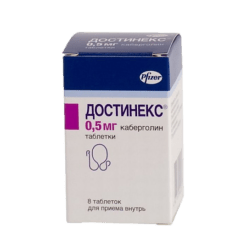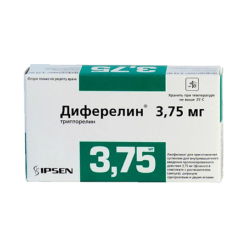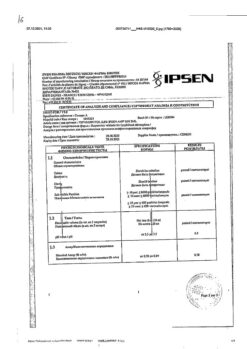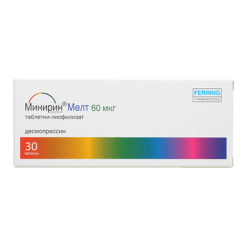No products in the cart.
Decapeptil, 0.1 mg/ml 1 ml syringes 7 pcs
€1.00
Out of stock
(E-mail when Stock is available)
Description
Pharmacodynamics
A synthetic analogue of gonadotropin-releasing hormone (GnRH). The replacement of the 6th amino acid residue in the natural GnRH molecule resulted in a more pronounced affinity for GnRH receptors and a longer half-life.
Tryptorelin causes an increase in FSH and LH levels in the blood immediately after administration, resulting in a short-term increase in the concentration of sex hormones. Prolonged stimulation of the pituitary gland (with a constant concentration of tryptorelin in the blood) leads to a blockade of gonadotropic function, resulting in a decrease in the level of sex hormones in the blood to post-castral or menopausal levels.
The effects described are reversible.
Animal studies have shown no teratogenic or mutagenic effects.
Pharmacokinetics
Absorption and distribution
In the first hours after the intravenous administration of the drug, Cmax triptorelin in the blood is recorded. Then the concentration of tryptorelin decreases markedly within 24 hours.
Metabolism and excretion
T1/2 tryptorelin in plasma is 18.7 min (T1/2 natural GnRH is 7.7 min). The clearance of tryptorelin (503 ml/min) is 3 times slower than that of natural GnRH (1766 ml/min) and consists of two components, fast and slow excretion.
Less than 4% of tryptorelin is excreted unchanged in the urine.
Pharmacokinetic tests were performed in female patients with a confirmed diagnosis of endometriosis or uterine myoma, patients with prostatic carcinoma, and healthy male volunteers.
Indications
Indications
For women:
endometriosis;
uterine fibroids;
infertility treatment using assisted reproductive technologies (including IVF and ET /embryo transfer/).
For men:
symptomatic treatment of progressive hormone-dependent prostate carcinoma.
Pharmacological effect
Pharmacological effect
Pharmacodynamics
A synthetic analogue of gonadotropin-releasing hormone (GnRH). The replacement of the 6th amino acid residue in the natural GnRH molecule resulted in a more pronounced affinity for GnRH receptors and a longer half-life.
Immediately after administration, triptorelin causes an increase in the level of FSH and LH in the blood, which leads to a short-term increase in the concentration of sex hormones. Long-term stimulation of the pituitary gland (at a constant concentration of triptorelin in the blood) leads to blockade of gonadotropic function, the result of which is a decrease in the level of sex hormones in the blood to post-castration or menopausal levels.
The described effects are reversible.
Animal studies have not revealed teratogenic or mutagenic effects.
Pharmacokinetics
Suction and distribution
In the first hours after intramuscular administration of the drug, Cmax of triptorelin in the blood is recorded. Triptorelin concentrations then decrease markedly within 24 hours.
Metabolism and excretion
T1/2 of triptorelin in plasma is 18.7 minutes (T1/2 of natural GnRH is 7.7 minutes). The clearance of triptorelin (503 ml/min) is 3 times slower than that of natural GnRH (1766 ml/min) and consists of two components – fast and slow clearance.
Less than 4% of triptorelin is excreted unchanged in the urine.
Pharmacokinetic tests were performed in patients with a confirmed diagnosis of endometriosis or uterine fibroids, patients with prostate carcinoma and healthy male volunteers.
Special instructions
Special instructions
The course of treatment with Decapeptyl should be carried out under the control of the level of sex hormones in the blood plasma.
For women
A study should be carried out to exclude possible pregnancy at the time of treatment. During therapy, the use of hormonal contraceptives is unacceptable. For endometriosis or uterine fibroids, treatment should be continued until the menstrual cycle is completely restored.
When carrying out therapy with Decapeptyl, you should not use drugs containing estrogens.
During the course of treatment, ultrasound monitoring of the size of fibroids and endometriotic nodes is required. A rapid decrease in the size of the uterus can lead to bleeding.
The woman should be warned that during the course of treatment with Decapeptyl, menstruation will be absent. If there are regular menstruation during Decapeptyl therapy, the patient should consult a doctor.
For men
A transient increase in plasma testosterone levels in some patients can lead to a temporary deterioration of the condition: urinary tract obstruction, bone pain caused by metastases, symptoms of spinal cord compression, muscle weakness, enlarged lymph nodes, swelling of the legs. If one of these symptoms occurs, the patient should consult a doctor.
During the initial phase of treatment, the use of an antiandrogen drug should be considered to suppress symptoms caused by increased testosterone levels.
Impact on the ability to drive vehicles and other mechanisms that require increased concentration
The drug does not affect the ability to drive vehicles and other activities that require high concentration and speed of psychomotor reactions.
Active ingredient
Active ingredient
Triptorelin
Composition
Composition
Active ingredients:
triptorelin acetate 105 mcg, which corresponds to the content of triptorelin 95.6 mcg.
Excipients:
sodium chloride,
glacial acetic acid,
water d/i.
Pregnancy
Pregnancy
The use of the drug during pregnancy and breastfeeding is contraindicated.
Contraindications
Contraindications
For women
pregnancy;
lactation period;
clinical manifestations or risk of osteoporosis.
With caution: use the drug when performing an assisted reproductive technology (IVF) program in patients with polycystic ovary syndrome, when the number of follicles determined by ultrasound is more than 10.
For men
hormonally independent prostate carcinoma;
previous surgical castration.
General
hypersensitivity to triptorelin or other components of the drug.
Side Effects
Side Effects
Side effects are caused by a decrease in the level of sex hormones in the blood, which can lead to the appearance in men and women of such symptoms as: mood lability, depression, weakened libido, frequent headaches, sleep disturbances, weight gain, hot flashes, increased sweating.
From the genitourinary system: obstruction of the urinary tract, pain during sexual intercourse. In women – vaginal dryness, uterine bleeding. In men – decreased potency, gynecomastia, decreased testicular size.
From the central nervous system and peripheral nervous system: paresthesia, visual impairment.
From the digestive system: nausea, loss of appetite, increased activity of liver transaminases, hypercholesterolemia.
From the musculoskeletal system: back pain, bone pain caused by metastases, spinal cord compression, muscle weakness, myalgia, arthralgia, bone demineralization (with long-term use).
Allergic reactions: itching, redness of the skin, fever, anaphylaxis.
Local reactions: rarely – pain at the injection site.
Other: thrombophlebitis, enlarged lymph nodes, swelling of the legs, in men – decreased beard growth and loss of hair on the chest, arms and legs.
All described adverse reactions disappear after completion of the course of treatment.
Interaction
Interaction
The interaction of Decapeptil with other drugs has not been established.
Overdose
Overdose
There were no cases of drug overdose.
If an overdose occurs, symptomatic treatment should be carried out.
Storage conditions
Storage conditions
In a dry place, at a temperature of 2–8 °C
Shelf life
Shelf life
3 years
Manufacturer
Manufacturer
Ferring GmbH, Germany
Additional information
| Shelf life | 3 years |
|---|---|
| Conditions of storage | In a dry place, at 2-8 °C |
| Manufacturer | Ferring GmbH, Germany |
| Medication form | solution |
| Brand | Ferring GmbH |
Related products
Buy Decapeptil, 0.1 mg/ml 1 ml syringes 7 pcs with delivery to USA, UK, Europe and over 120 other countries.





